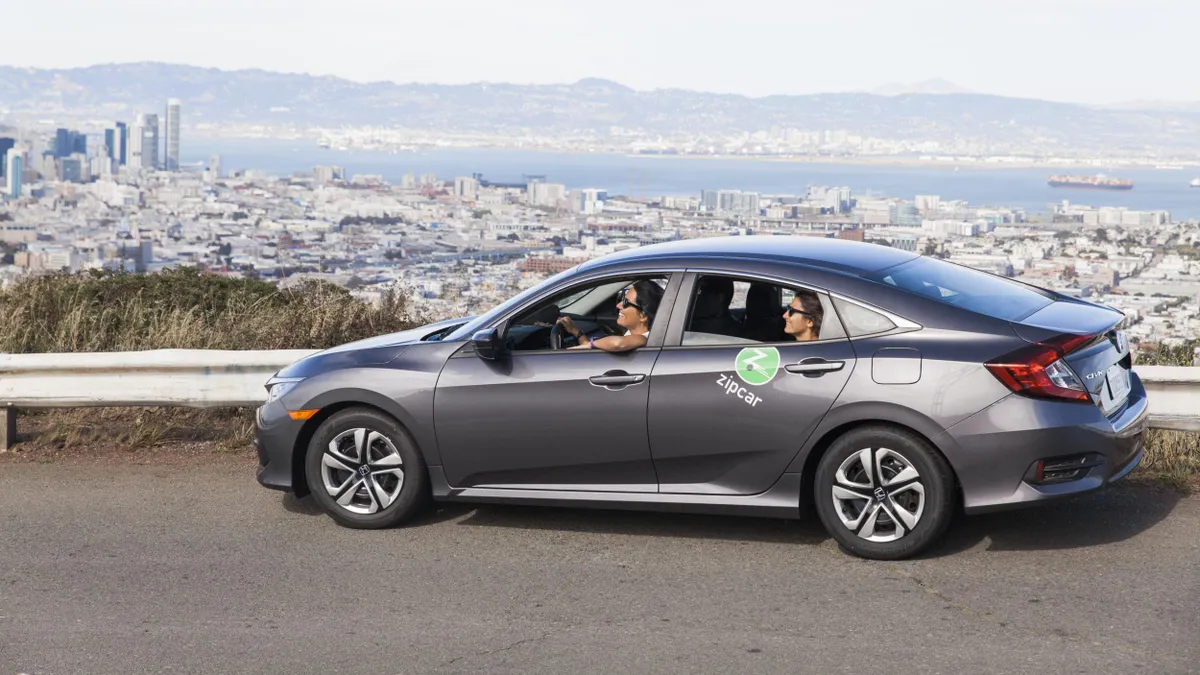Dive Brief:
- Car-sharing company Zipcar released its first impact report, showing that every shared vehicle on the streets eliminates the need for 13 personally-owned ones, with 54% of members saying they got rid of a personal vehicle after joining Zipcar.
- The report, which uses third-party data and research as well as Zipcar’s internal figures, found members rely on Zipcar for longer trips but use other methods of transport like walking, biking and public transit for shorter journeys. It also found that each individual Zipcar, which can be found in 500 towns and cities worldwide, serves 80 individual members.
- "Our mission as a company is to enable simple and responsible urban living, and I think a lot of the data that you'll see is a testament to the progress we've made towards that mission," Zipcar President Tracey Zhen told Smart Cities Dive in an interview.
Dive Insight:
Car-sharing has become increasingly important to city leaders, with the likes of New York City setting aside more than 300 spaces for the programs, while ride-hailing company Lyft is also looking to push more people to use the service through its "Ditch Your Car" promotion. Zhen said Zipcar, which was founded in 2000, has been a “pionee[r] of car-sharing,” impacting the environment by reducing members’ carbon emissions by up to 1,600 pounds per year as well as having a social impact for members.
But things have changed since the company was founded, with a slew of multimodal options now available to city residents, including ride-hailing, dockless bikes and scooters and more transit. Despite what may seem a crowded marketplace, Zhen said the company will continue to play a key role, especially as Zipcar sees its true competition as being individual car ownership, rather than other companies. "In our vision of the future, we hope that there's a day when car-shares outnumber car owners," Zhen said. "That's our broader vision. I think we think about all the mobility options and multimodal options that are available, we think that will help accelerate more alternatives to car ownership."
In a future that will likely include autonomous vehicles (AVs), Zhen said the company is ideally suited to the future. She said Zipcar already has experience in managing a large member base at scale and a fleet of vehicles at scale, so having the company be based around having AVs that can be hailed on a smartphone app then delivered should not be too much of a stretch.
And Zhen said Zipcar may have a leg up on that evolution compared to ride-hailing companies, which already are experimenting heavily with automation, given their fleet management expertise. But, she said, in an AV future, ride-hailing and car-sharing will likely "start to merge more and more."
"If you think about today, one of the challenges for ride-hail is the driver is their fleet manager," Zhen said. "They own the car, insure the car, maintain the car. To do that at scale on the day the driver doesn't exist because of autonomy, that's a difficult thing to do and we've been working at it for 18 years, and we think we have a bit of an advantage in our experience."












